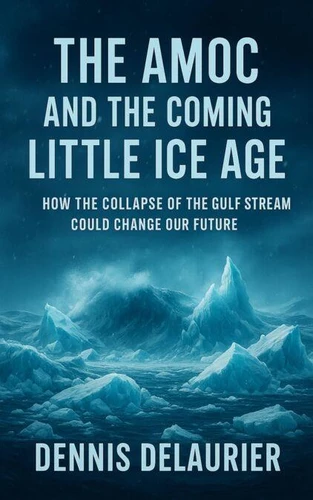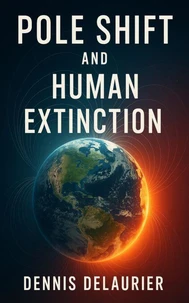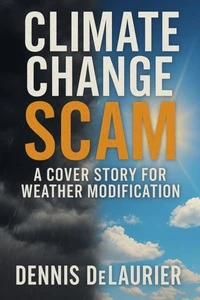Nouveauté
The AMOC and the Coming Little Ice Age
Par :Formats :
Disponible dans votre compte client Decitre ou Furet du Nord dès validation de votre commande. Le format ePub est :
- Compatible avec une lecture sur My Vivlio (smartphone, tablette, ordinateur)
- Compatible avec une lecture sur liseuses Vivlio
- Pour les liseuses autres que Vivlio, vous devez utiliser le logiciel Adobe Digital Edition. Non compatible avec la lecture sur les liseuses Kindle, Remarkable et Sony
 , qui est-ce ?
, qui est-ce ?Notre partenaire de plateforme de lecture numérique où vous retrouverez l'ensemble de vos ebooks gratuitement
Pour en savoir plus sur nos ebooks, consultez notre aide en ligne ici
- FormatePub
- ISBN8232627621
- EAN9798232627621
- Date de parution28/10/2025
- Protection num.pas de protection
- Infos supplémentairesepub
- ÉditeurHamza elmir
Résumé
What if the AMOC Collapsed?If the AMOC collapses, this would exacerbate climate stresses on European agriculture by shortening growing seasons, increasing extreme weather events, and disrupting food production, thereby posing a substantial threat to Europe's food security and agricultural economy. An AMOC (Atlantic Meridional Overturning Circulation) collapse would have significant and widespread impacts on North America's climate, alongside global effects.
Notably, it would cause a pronounced cooling in eastern North America, with temperatures potentially dropping by 3°C or more, especially along the northeastern coast. Sea levels in these regions could rise substantially due to reduced circulation and oceanic adjustments. The weakening or collapse would also disrupt atmospheric patterns, such as jet streams, increasing the likelihood of extreme weather events, including severe cold spells, storms, and droughts.
For example, the Gulf Stream's diminished strength would cause warm water to pool along the eastern coast, leading to higher sea levels and more intense storms, while interior regions could experience colder and more unpredictable weather. A collapse of the AMOC would have severe and far-reaching impacts on global food supplies. The disruption of this crucial ocean circulation would alter climate patterns worldwide, causing regional cooling in parts of the Northern Hemisphere, including Europe and eastern North America, while exacerbating warming in parts of the Southern Hemisphere.
This climate shift would shorten growing seasons and reduce agricultural productivity, especially in key grain-producing regions such as Europe, North America, and parts of Africa.
Notably, it would cause a pronounced cooling in eastern North America, with temperatures potentially dropping by 3°C or more, especially along the northeastern coast. Sea levels in these regions could rise substantially due to reduced circulation and oceanic adjustments. The weakening or collapse would also disrupt atmospheric patterns, such as jet streams, increasing the likelihood of extreme weather events, including severe cold spells, storms, and droughts.
For example, the Gulf Stream's diminished strength would cause warm water to pool along the eastern coast, leading to higher sea levels and more intense storms, while interior regions could experience colder and more unpredictable weather. A collapse of the AMOC would have severe and far-reaching impacts on global food supplies. The disruption of this crucial ocean circulation would alter climate patterns worldwide, causing regional cooling in parts of the Northern Hemisphere, including Europe and eastern North America, while exacerbating warming in parts of the Southern Hemisphere.
This climate shift would shorten growing seasons and reduce agricultural productivity, especially in key grain-producing regions such as Europe, North America, and parts of Africa.
What if the AMOC Collapsed?If the AMOC collapses, this would exacerbate climate stresses on European agriculture by shortening growing seasons, increasing extreme weather events, and disrupting food production, thereby posing a substantial threat to Europe's food security and agricultural economy. An AMOC (Atlantic Meridional Overturning Circulation) collapse would have significant and widespread impacts on North America's climate, alongside global effects.
Notably, it would cause a pronounced cooling in eastern North America, with temperatures potentially dropping by 3°C or more, especially along the northeastern coast. Sea levels in these regions could rise substantially due to reduced circulation and oceanic adjustments. The weakening or collapse would also disrupt atmospheric patterns, such as jet streams, increasing the likelihood of extreme weather events, including severe cold spells, storms, and droughts.
For example, the Gulf Stream's diminished strength would cause warm water to pool along the eastern coast, leading to higher sea levels and more intense storms, while interior regions could experience colder and more unpredictable weather. A collapse of the AMOC would have severe and far-reaching impacts on global food supplies. The disruption of this crucial ocean circulation would alter climate patterns worldwide, causing regional cooling in parts of the Northern Hemisphere, including Europe and eastern North America, while exacerbating warming in parts of the Southern Hemisphere.
This climate shift would shorten growing seasons and reduce agricultural productivity, especially in key grain-producing regions such as Europe, North America, and parts of Africa.
Notably, it would cause a pronounced cooling in eastern North America, with temperatures potentially dropping by 3°C or more, especially along the northeastern coast. Sea levels in these regions could rise substantially due to reduced circulation and oceanic adjustments. The weakening or collapse would also disrupt atmospheric patterns, such as jet streams, increasing the likelihood of extreme weather events, including severe cold spells, storms, and droughts.
For example, the Gulf Stream's diminished strength would cause warm water to pool along the eastern coast, leading to higher sea levels and more intense storms, while interior regions could experience colder and more unpredictable weather. A collapse of the AMOC would have severe and far-reaching impacts on global food supplies. The disruption of this crucial ocean circulation would alter climate patterns worldwide, causing regional cooling in parts of the Northern Hemisphere, including Europe and eastern North America, while exacerbating warming in parts of the Southern Hemisphere.
This climate shift would shorten growing seasons and reduce agricultural productivity, especially in key grain-producing regions such as Europe, North America, and parts of Africa.




















